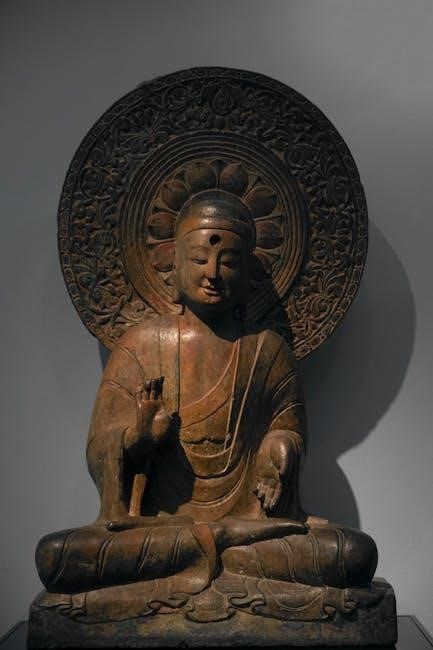philosophy and the future pf europe fernanda gallo pdf
Fernanda Gallo‚ a renowned intellectual historian‚ explores the intersection of philosophy and European identity․ Her research connects 19th-century Italian thought to broader European intellectual traditions‚ emphasizing Hegel’s influence and the Mediterranean’s role in shaping philosophical consciousness․ Gallo’s work bridges history‚ politics‚ and ideas‚ offering insights into the future of Europe through a philosophical lens․
1․1 Overview of Fernanda Gallo’s Academic Background
Fernanda Gallo is Associate Professor in History and Politics at the University of Cambridge and Fellow of Homerton College․ Her academic expertise lies in 19th-century Mediterranean intellectual history‚ focusing on Italy‚ Spain‚ Portugal‚ and Greece․ Gallo’s research emphasizes transnational exchanges and the role of philosophy in shaping political thought․ She has published extensively on Hegel’s influence in Italy and the construction of European identity․ Her latest book‚ Hegel and Italian Political Thought‚ explores the practice of ideas in 19th-century Italy‚ bridging history‚ politics‚ and philosophy․ Gallo also teaches courses on European history and political thought;
1․2 The Focus of Her Research: Philosophy and Europe
Fernanda Gallo’s research centers on 19th-century Mediterranean history‚ particularly Italy‚ Spain‚ Portugal‚ and Greece․ She examines how philosophical ideas‚ especially Hegel’s‚ influenced political thought and European identity․ Gallo’s work explores the Mediterranean’s role in shaping Europe’s intellectual landscape‚ emphasizing transnational exchanges and the construction of moral and political consciousness․ Her studies link historical philosophical debates to contemporary discussions on Europe’s future‚ highlighting the enduring relevance of 19th-century ideas in understanding modern challenges and opportunities for European unity․
Historical Context of European Philosophy
European philosophy’s historical context reveals how thinkers like Bertrando Spaventa and Hegel shaped ideas of identity and unity‚ influencing modern debates on Europe’s future and moral consciousness․
2․1 The Role of Philosophy in Shaping European Identity
Philosophy has played a pivotal role in shaping European identity by fostering intellectual and cultural unity․ Thinkers like Bertrando Spaventa emphasized the interconnectedness of Italian and European thought‚ while Hegel’s ideas influenced political and moral consciousness․ Fernanda Gallo’s work highlights how 19th-century radicals imagined a unified Europe‚ laying the groundwork for modern philosophical debates about identity and integration․ By examining these historical ideas‚ we gain insight into how philosophy continues to shape Europe’s sense of self and its future trajectory․
2․2 Key Thinkers Influencing European Thought
Key thinkers like Bertrando Spaventa and Georg Wilhelm Friedrich Hegel have profoundly influenced European thought․ Spaventa’s work‚ particularly his exploration of Italian philosophy within a European context‚ underscored the importance of intellectual unity․ Hegel’s political philosophy‚ with its emphasis on dialectical reasoning and the state‚ shaped ideas about governance and identity․ Fernanda Gallo’s research highlights how these thinkers’ ideas continue to resonate‚ offering frameworks for understanding Europe’s past and envisioning its future․ Their contributions remain central to contemporary debates about European unity and philosophical identity․
Bertrando Spaventa and Italian Political Thought
Bertrando Spaventa’s work‚ particularly La filosofia italiana‚ emphasized the unity of Italian and European philosophical traditions‚ shaping moral and political consciousness in 19th-century Italy and beyond․
3․1 Spaventa’s Contribution to European Consciousness
Bertrando Spaventa’s work‚ particularly La filosofia italiana‚ played a pivotal role in shaping European consciousness by bridging Italian and European philosophical traditions․ His ideas emphasized the unity of philosophical thought across borders‚ contributing to a shared moral and political framework․ Spaventa’s analysis highlighted the interconnectedness of Italian and European intellectual history‚ fostering a sense of collective identity․ His work remains influential in understanding the philosophical underpinnings of European unity and its relevance to contemporary discussions on Europe’s future․
3․2 The Concept of “La filosofia italiana”
Bertrando Spaventa’s concept of “La filosofia italiana” highlights the unique contributions of Italian philosophy to European thought‚ emphasizing its historical and cultural significance․ His work bridges Italian intellectual traditions with broader European philosophical currents‚ fostering a sense of unity and shared identity․ Spaventa’s ideas underscore the importance of understanding philosophy as a tool for shaping moral and political consciousness‚ both nationally and continentally․ This concept remains central to Fernanda Gallo’s research‚ as it provides a foundational framework for exploring the intersection of philosophy and Europe’s future․
Hegel’s Influence on Italian Political Philosophy
Hegel’s political philosophy significantly shaped Italian thought‚ offering a framework for understanding state and society․ His ideas were adapted to address Italy’s unique historical and cultural context․
4․1 Hegel’s Political Philosophy and Its Impact
Hegel’s political philosophy emphasized the dialectical development of state and society‚ influencing 19th-century Italian thought․ His ideas on ethical life (Sittlichkeit) and the role of the state resonated deeply‚ shaping debates on national identity and governance․ Italian intellectuals adapted Hegelian concepts to address their country’s unification and political challenges․ This intellectual engagement not only enriched Italian political theory but also contributed to a broader European discourse on modern governance and collective identity‚ highlighting philosophy’s role in addressing real-world political dilemmas․
4․2 The Practice of Ideas in 19th-Century Italy
In 19th-century Italy‚ philosophical ideas were not merely theoretical but deeply practical‚ shaping political action and cultural transformation․ Intellectuals like Bertrando Spaventa applied Hegelian principles to advocate for national unity and constitutional governance․ This period saw the emergence of a vibrant public sphere where philosophy informed debates on identity‚ citizenship‚ and progress․ The practical application of these ideas not only influenced Italy’s unification but also contributed to a broader European intellectual tradition‚ demonstrating how philosophy could be a powerful tool for social and political change․

The Future of Europe: A Philosophical Perspective
Philosophical insights from 19th-century thinkers like Hegel and Spaventa illuminate Europe’s path forward‚ emphasizing unity‚ diversity‚ and shared values to address modern challenges and foster a cohesive future․
5․1 The Vision of a Unified Europe
The vision of a unified Europe‚ rooted in 19th-century philosophical thought‚ imagined a continent transcending borders‚ united by shared ideals․ Italian radicals‚ inspired by Hegel and Spaventa‚ envisioned a harmonious Europe where diversity and unity coexist․ This idea‚ central to Gallo’s research‚ emphasizes moral and political frameworks for collective progress․ The European Union embodies this vision partially‚ yet challenges like nationalism and inequality persist․ Gallo’s work explores whether this historical dream can become a reality‚ blending philosophical theory with practical political solutions for a cohesive European future․
5․2 Challenges and Opportunities for European Unity
European unity faces challenges like rising nationalism‚ economic disparities‚ and cultural divides‚ which test the continent’s cohesive vision․ However‚ these challenges also present opportunities for renewal․ Fernanda Gallo highlights how philosophical thought‚ particularly Hegel’s ideas‚ can address these issues by fostering a shared moral and political consciousness․ The Mediterranean perspective‚ emphasizing transnational exchanges‚ offers a framework for unity in diversity․ By revisiting 19th-century intellectual traditions‚ Gallo’s work underscores the potential for philosophy to inspire innovative solutions‚ bridging historical divides and envisioning a future where Europe’s plural identities strengthen‚ rather than weaken‚ its collective identity․

The Mediterranean Perspective in European Thought
Fernanda Gallo’s work highlights the Mediterranean’s role in shaping European identity through transnational intellectual exchanges‚ emphasizing its cultural richness and historical significance in forming philosophical consciousness․
6․1 The Role of the Mediterranean in Shaping Europe
The Mediterranean‚ as a cultural and intellectual crossroads‚ has profoundly shaped Europe’s philosophical and political identity․ Fernanda Gallo’s research emphasizes how transnational exchanges across the Mediterranean influenced European thought‚ blending diverse traditions and fostering a unified consciousness․ This region’s historical role in connecting Europe‚ Africa‚ and the Middle East highlights its significance in shaping philosophical ideas that continue to resonate today․ By examining the Mediterranean’s impact‚ Gallo challenges Eurocentric narratives‚ offering a more inclusive perspective on Europe’s intellectual and cultural development․
6․2 Transnational Intellectual Exchanges
Fernanda Gallo’s research underscores the significance of transnational intellectual exchanges in shaping European thought․ By examining the flow of ideas across the Mediterranean‚ she reveals how philosophers like Hegel influenced Italian and broader European movements․ These exchanges‚ facilitated by intellectuals and their networks‚ bridged local and universal perspectives‚ fostering a shared philosophical consciousness․ Gallo’s work highlights how such interactions not only enriched 19th-century thought but also continue to inform contemporary debates on Europe’s identity and future‚ emphasizing the enduring relevance of these historical connections․

The Construction of Moral and Political Consciousness
Fernanda Gallo examines how philosophy shaped moral and political consciousness in Italy and Europe․ Her work highlights the role of thinkers like Bertrando Spaventa in fostering a unified identity․
7․1 Philosophy as a Tool for Social Change
Philosophy‚ as explored by Fernanda Gallo‚ serves as a powerful tool for social change by shaping moral and political frameworks․ Through thinkers like Bertrando Spaventa‚ Gallo highlights how philosophical ideas influenced 19th-century Italy’s unification and identity formation․ Her work underscores the practical application of Hegelian thought in addressing societal challenges‚ demonstrating how philosophy can inspire transformative change․ By linking intellectual history to real-world impacts‚ Gallo illustrates the enduring relevance of philosophical inquiry in fostering progress and unity across Europe․
7․2 The Role of Intellectuals in European Development
Intellectuals‚ as highlighted by Fernanda Gallo‚ have played a pivotal role in shaping Europe’s development by bridging philosophy and political action․ Figures like Bertrando Spaventa and Hegelian thinkers influenced movements for unity and identity across the continent․ Gallo emphasizes how these intellectuals translated abstract ideas into practical frameworks‚ fostering moral and political consciousness․ Their work not only addressed historical challenges but also laid the groundwork for contemporary discussions on European integration․ By examining their contributions‚ Gallo illustrates the enduring impact of intellectual leadership in guiding Europe’s evolution and addressing its future challenges․
Fernanda Gallo’s Academic Contributions
Fernanda Gallo is a leading scholar in 19th-century Mediterranean history‚ shaping discourse on European thought․ Her work bridges philosophy‚ politics‚ and history‚ influencing contemporary debates․
8․1 Her Latest Book: Hegel and Italian Political Thought
Fernanda Gallo’s latest book‚ Hegel and Italian Political Thought: The Practice of Ideas‚ 1832-1900‚ explores Hegel’s profound influence on 19th-century Italian political philosophy․ Published by Cambridge University Press‚ the book examines how Hegelian ideas were adapted and applied in Italy‚ shaping its political and intellectual landscape․ Gallo’s work bridges historical analysis with contemporary relevance‚ offering insights into how philosophical traditions continue to inform European identity and unity․ Her research underscores the enduring legacy of Hegel’s thought in shaping political consciousness across the Mediterranean and beyond․
8․2 Teaching and Research Focus Areas
Fernanda Gallo’s academic work focuses on 19th-century Mediterranean history‚ with particular emphasis on Italy‚ Spain‚ Portugal‚ and Greece․ She lectures on modern European history and political thought‚ exploring the intersection of ideas and their transnational dissemination․ Her research examines the role of philosophy in shaping political consciousness and identity‚ particularly through Hegelian thought․ Gallo’s teaching and research highlight the interconnectedness of Mediterranean intellectual traditions and their relevance to contemporary European debates‚ offering a unique perspective on the historical roots of modern political ideologies․

The Intersection of History‚ Politics‚ and Ideas
Fernanda Gallo’s research seamlessly intertwines history‚ politics‚ and philosophical ideas‚ focusing on their interplay in shaping European identity and consciousness‚ particularly through Mediterranean perspectives․
9․1 Understanding Ideas in Different Spaces
Fernanda Gallo’s research emphasizes the importance of contextualizing philosophical ideas within specific historical and geographical spaces․ By examining Hegelian thought and its adaptation in 19th-century Italy‚ she illustrates how ideas evolve when transplanted to new cultural and political environments․ This approach highlights the Mediterranean region’s unique role in shaping European consciousness‚ bridging theory and practice․ Gallo’s work demonstrates that understanding ideas in different spaces is crucial for grasping their relevance to contemporary philosophical and political debates about Europe’s future․
9․2 The Importance of Hegelian Thought
Hegelian philosophy plays a central role in Fernanda Gallo’s analysis of European intellectual history․ Hegel’s ideas‚ particularly his political philosophy‚ influenced 19th-century Italian thinkers‚ shaping their understanding of state and society․ Gallo highlights how Hegelian thought bridged theory and practice‚ offering a framework for addressing Europe’s political and philosophical challenges․ By examining Hegel’s legacy‚ Gallo underscores the enduring relevance of his ideas in understanding the evolution of European identity and the moral-political consciousness that underpins it․ This emphasis on Hegel’s thought illuminates its continued significance in contemporary debates about Europe’s future․

Current Debates on Europe’s Future
Current debates on Europe’s future often center on unity‚ identity‚ and philosophical foundations․ Fernanda Gallo’s work highlights how 19th-century ideas continue to shape these discussions‚ offering insights into the role of philosophy in addressing contemporary challenges․
10․1 The Role of Philosophy in Modern Europe
Fernanda Gallo underscores philosophy’s vital role in shaping modern Europe’s identity and future․ Her work highlights how philosophical thought‚ rooted in 19th-century ideas like Hegel’s‚ continues to influence contemporary debates on unity and cultural identity․ By examining historical intellectual exchanges‚ Gallo illustrates how philosophy bridges political and cultural divides‚ offering a framework for addressing Europe’s current challenges․ Her research emphasizes the enduring relevance of philosophical inquiry in fostering moral and political consciousness‚ essential for navigating the complexities of a unified yet diverse Europe․
10․2 Relevance of 19th-Century Ideas Today
19th-century philosophical ideas remain highly relevant in addressing modern Europe’s challenges․ Fernanda Gallo’s work highlights how thinkers like Hegel and Spaventa shaped visions of unity and cultural identity․ Their ideas‚ emphasizing moral and political consciousness‚ resonate today as Europe grapples with unity amidst diversity․ The Mediterranean perspective‚ explored in Gallo’s research‚ underscores the importance of transnational dialogue and cooperation․ These historical concepts provide a foundation for understanding contemporary issues‚ offering insights into how philosophy can guide Europe’s future by fostering solidarity and addressing nationalism‚ inequality‚ and cultural fragmentation․
Fernanda Gallo’s work underscores the enduring relevance of 19th-century philosophical ideas in shaping Europe’s future․ Her research highlights the importance of intellectual traditions in fostering unity and identity‚ offering valuable insights for contemporary debates on Europe’s moral‚ political‚ and cultural trajectory․
11․1 Summary of Key Points
Fernanda Gallo’s work bridges philosophy‚ history‚ and politics‚ emphasizing the role of 19th-century European thought in shaping contemporary identity․ Her research highlights Bertrando Spaventa’s influence on Italian consciousness and Hegel’s philosophical legacy․ By exploring transnational intellectual exchanges‚ Gallo underscores the Mediterranean’s role in European development․ Her scholarship reveals how historic ideas remain relevant for addressing modern challenges‚ advocating for a unified Europe rooted in shared philosophical traditions․ Gallo’s insights offer a nuanced understanding of Europe’s past‚ present‚ and future‚ emphasizing the enduring power of philosophical inquiry in guiding moral and political evolution․
11․2 Final Thoughts on Philosophy and Europe’s Future
Philosophy remains central to understanding Europe’s future‚ as highlighted by Fernanda Gallo’s work․ By exploring historical thinkers like Spaventa and Hegel‚ Gallo underscores the enduring relevance of philosophical inquiry in shaping moral and political consciousness․ Her research emphasizes the Mediterranean’s role in fostering dialogue and unity‚ advocating for a future where diverse traditions converge․ Gallo’s insights challenge us to rethink Europe’s trajectory‚ ensuring its future is rooted in shared values and intellectual exchange‚ rather than division․ Philosophy‚ she suggests‚ is not just a relic of the past but a guiding force for Europe’s collective progress․
References and Further Reading
- Fernanda Gallo‚ Hegel and Italian Political Thought: The Practice of Ideas‚ 1832-1900 (Cambridge University Press‚ 2024)․
- Gallo‚ F․ (2015)․ “Philosophical Revolution and the Shaping of European Consciousness․” History of European Ideas‚ 51(2): 387-391․
- Mediterranean Europe(s): Rethinking Europe from its Southern Shores‚ co-authored with Matthew D’Auria (2022)․
12․1 Key Sources and Recommended Literature
Key sources include Fernanda Gallo’s Hegel and Italian Political Thought: The Practice of Ideas‚ 1832-1900‚ offering insights into Hegel’s influence on Italian and European thought․ Her article “Philosophical Revolution and the Shaping of European Consciousness” (2015) explores Spaventa’s role in shaping European identity․ Additionally‚ Mediterranean Europe(s): Rethinking Europe from its Southern Shores (co-authored with Matthew D’Auria‚ 2022) provides a transnational perspective․ For further reading‚ works on Hegelian philosophy‚ Italian Risorgimento‚ and Mediterranean intellectual history are recommended to deepen understanding of Gallo’s research․

